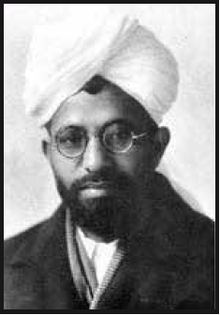Abdul Rahim Dard
An editor has nominated this article for deletion. You are welcome to participate in the deletion discussion, which will decide whether or not to retain it. |
Abdul Rahim Dard | |
|---|---|
 | |
| Born | 19 June 1894 |
| Died | 7 December 1955 (aged 61) |
| Occupation(s) | Muslim Missionary, Religious Scholar, and Pakistan Movement Activist |
| Known for | Imam of historic Fazl Mosque and the relaunch of Jinnahs political career |
Maulana Abdul Rahim Dard, better known as A. R. Dard (1894–1955) was an Ahmadi Muslim writer, missionary, and political activist for the Pakistan movement who served as the Imam of the historic Fazl Mosque the premier gathering place for Indian Muslims regardless of denomination in London. He is most famous for convincing Jinnah to return to British India and fight for the Pakistan movement[1]
Early life
Maulana Abur Rahim Dard, son of Qadir Bakhsh, was born in 1894 in Ludhiana and received his early education there, in Lahore and Patiala and did his M.A.
He was present at the age of six at the Revealed Sermon (Khutba Ilhamiyah) of Mirza Ghulam Ahmad in 1900, and reportedly sharpened pencils for the scribes who were writing down the Revealed Sermon. He devoted his life for the cause of the Ahmadiyya Muslim Jama'at in 1919 and settled permanently in Qadian.
Career
A. R. Dard was an eloquent speaker, Prominent Ahmadiyya missionary ,and a prolific writer. He addressed the audience of numerous events such as Jalsa Salanas, Interfaith Events, and Political Debates on Pakistan. He also wrote many books both in English and Urdu, and was a prominent writer for the Review of Religions magazine.
A. R. Dard met Muhammad Ali Jinnah in March 1933, (who getting utterly disappointed from Indian Politics had returned to England and started his legal practice there), and tried to convince him to return to India being direly needed by the Indian Muslims. Dard told Jinnah that Jinnah's abandonment of politics in British India him a "traitor" for the Muslim cause To symbolize his return to politics, A R Dard arranged a lecture titled The Future of India which was presided over by Sir Nairne Sandeman in which Jinnah criticized the recent White Paper on Indian Constitutional Reform and argued for self-government by Indians.[2] at the Fazl Mosque in London in April 1933 to facilitate Jinnah's return to the political scene. In fact, Jinnah is quoted saying:
"The eloquent persuasion of the Imam (A R Dard) left me no way of escape".
With the consensus of the All India Kashmir Committee he became its Secretary. He served the Jama'at as Nazir Sadr Anjuman Ahmadiyya for many years, and accompanied Khalifatul Masih II.
Religion
He was the Private Secretary to Khalifatul Masih II from 1920–1924 and accompanying him to Damascus, Palestine, Egypt, Italy and France ultimately reaching England on 22 August 1924 for the Wembley's Conference of Living Religions 1924[6][7] in 1924 and was appointed as the missionary in Charge of the London Mission (UK). He served as an Ahmadiyya missionary in England for a total of 10 years in two terms. The Fazl Mosque in London, was built in 1926 under his supervision. He finally returned to Qadian in 1938.
A. R, Dard was Imam of the Fazl Mosque in London twice, from 1924 to 1928 and then again from 1931 till 1938. He wrote Life of Ahmad – Founder of the Ahmadiyya Movement (1948) a biography which coveres the life of Ahmad, considered the Promised Messiah by Ahmadis, up to 1901, however, he was unable to complete the work.[8][9][10][11] He also wrote a book "the early Islamic Caliphate"[12]
References
- ^ Biography A. R. Dard, by Fareed Ahmad
- ^ Pakistan Exists
- ^ Civil and Military Gazette, Lahore, 8 April 1933.
- ^ Madras Mail, 7 April 1933.
- ^ Sunday Times(London) 4 September 1933
- ^ Proceedings of the Parliament of Living Religions, 1924;
- ^ alislam.org Participation in the Wembley Conference London -
- ^ www.alislam.org About the Author, A. R. Dard, "the Life of Ahmad";
- ^ Review of Religions Ahmadiyya Community Vol 65 p158 1971 "The Khalifa-tul Masih II went more than two miles on foot out of town to receive Maulana Abdurr Rahim Dard."
- ^ Nathalie Clayer, Eric Germain Islam in Interwar Europe 2008 p51 "... Abdullah Yusuf Ali gave speeches on such occasions.58 Indeed, both Fateh Sayal and Abdul Rahim Dard, the two most prominent Ahmadi missionaries after the First World War, were very much part of the mainstream Indian Muslim network "
- ^ Biography A. R. Dard, by Fareed Ahmad
- ^ Early Islamic Caliphate (Rightly Guided Caliphate) by Abdur Rahim Dard (1938) [1]
